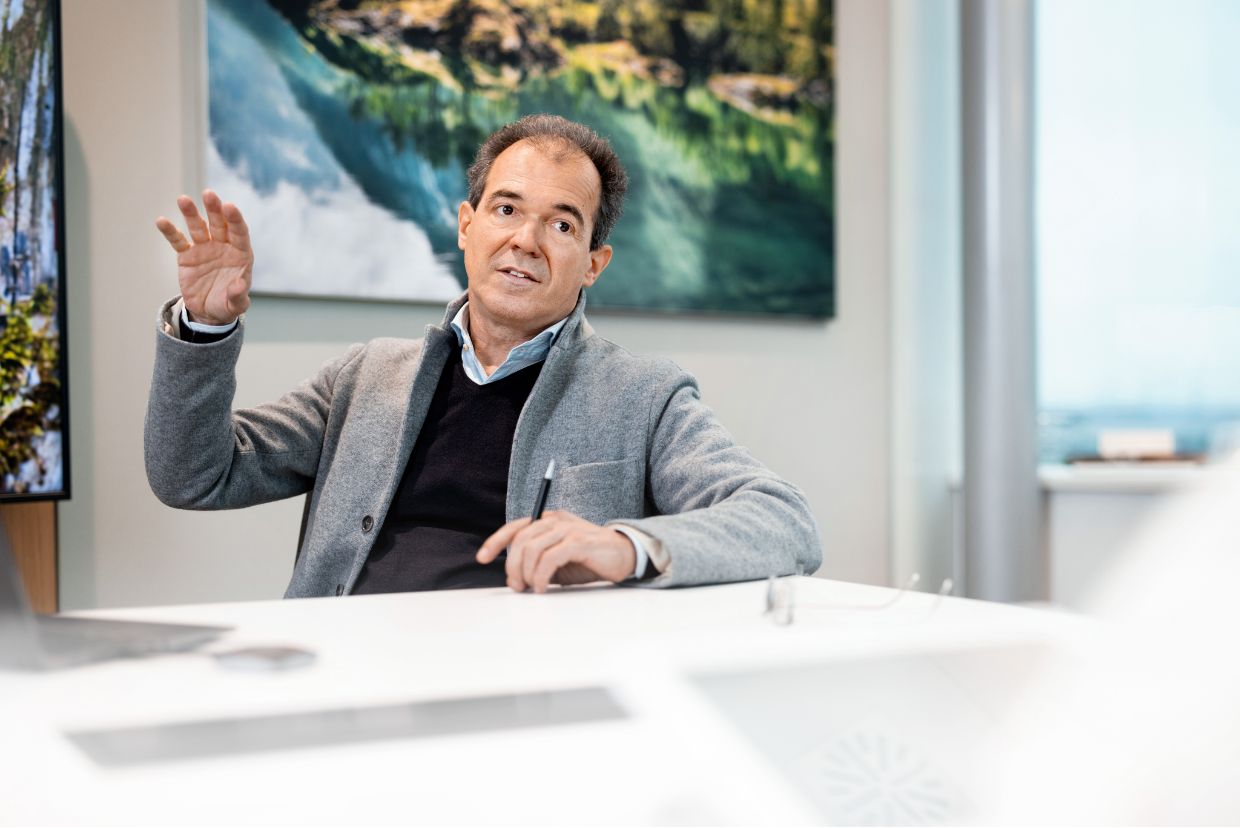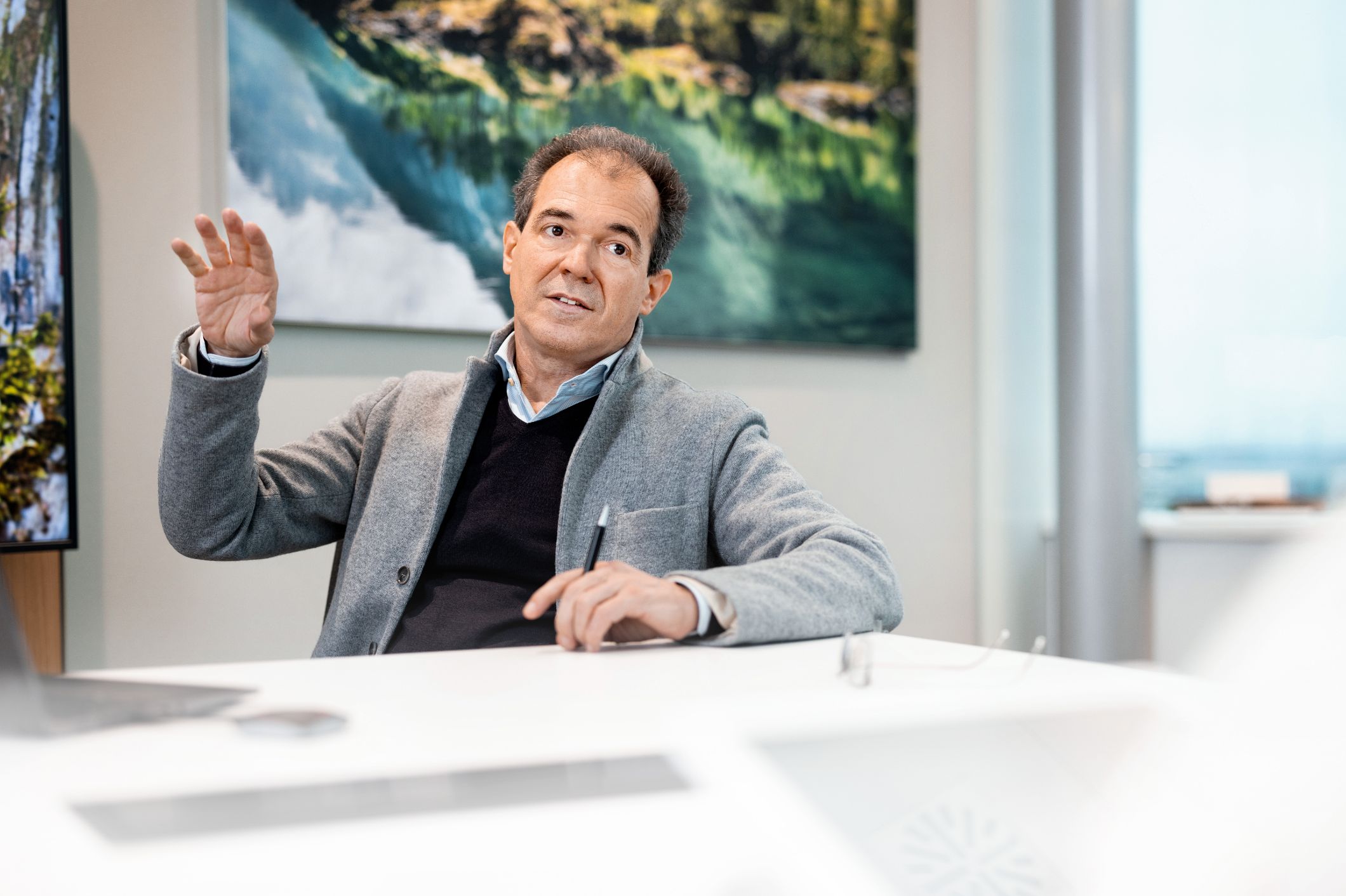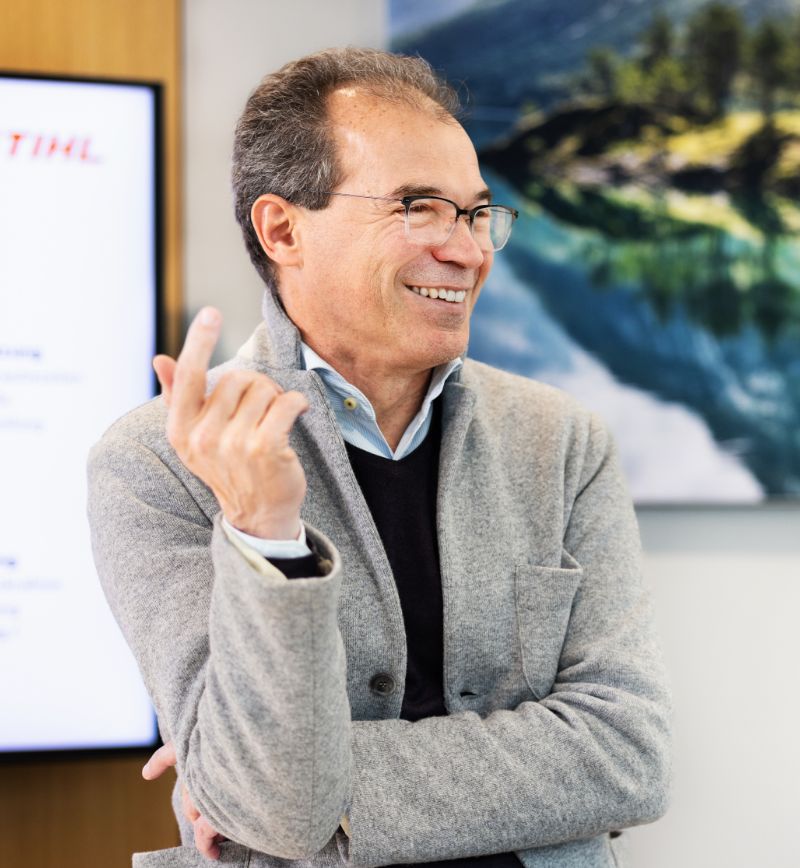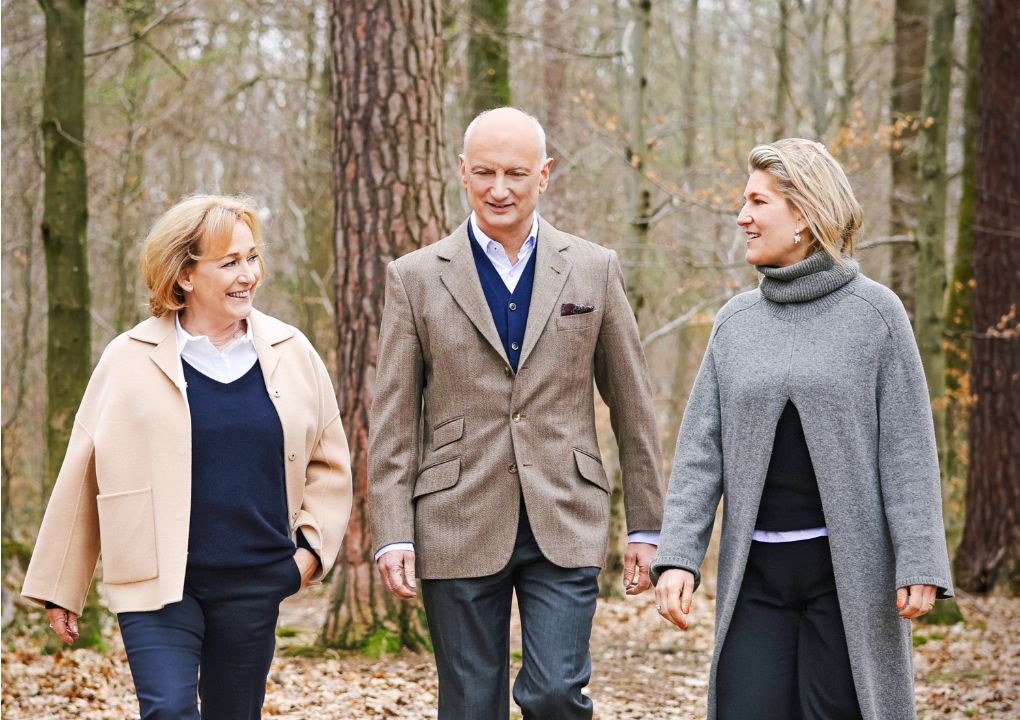
3 QUESTIONS FOR DR. FRIEDEMANN STOCK
Dr. Friedemann Stock has been the STIHL Group’s Vice President Sustainability since 2021, putting him in charge of everything sustainability-related at the company. A physicist by training, Stock needs a clear head and perseverance to master the challenges.

Local roots, global growth
Strong roots give STIHL the power to grow. In our nearly 100 years, we have gone from being a Swabian family business to being a global player. Everything we do is focused on people, nature, and their power to grow. That is what has driven us so far, and it will remain our source of inspiration and motivation going forward.
The STIHL Group is one of the world’s leading manufacturers of chainsaws and other outdoor power equipment. Since 1971, we have been the world’s top-selling chainsaw brand. Andreas Stihl founded his company in Bad Cannstatt (in the German state of Baden-Württemberg) in 1926. Today, our Group’s production and distribution network spans the entire globe.
Our production network includes plants, each of them legally independent, in seven countries. The production companies are responsible for manufacturing cast-magnesium components, saw chains, carburetors, and other products. The most recent addition to the STIHL Group is Mogatec GmbH1, a company based in the German state of Saxony that specializes in garden technology. Prior to the acquisition in 2023, we had maintained a trust-centered business relationship with Mogatec GmbH for nearly 30 years. The deal strengthens STIHL in the growing battery market. More importantly, though, the further expansion of the STIHL Group’s depth of production will also make it even more resilient against uncertainties in global supply chains.
Our area of activity
The STIHL Group develops, manufactures, and distributes power equipment for forestry, agriculture, landscaping, construction, and gardening enthusiasts. In addition to our best-known product group, chainsaws, our core technological expertise covers brushcutters, hedge trimmers, blowers, mistblowers, cleaning systems, cut-off machines, earth augers, lawn mowers, and robotic mowers.
STIHL is steadily evolving from an engineering company to a provider of mechatronic and software solutions. We are currently supporting this transformation by making investments in the digitalization of our products and services, to name just one example. When it comes to battery-powered technology, however, STIHL has been a driving force in the market since 2009. Even though we are hard at work making our traditional business involving gasoline-powered tools more and more environmentally friendly, and plan to continue offering such equipment in the long term, battery-powered tools are the main driver of our growth. We intend to raise the share of sales attributable to battery-operated tools to at least 35 percent by 2027, with a target of 80 percent by 2035. In 2023, that figure stood at approximately 24 percent – an increase of around 4 percent compared to 2022. In Germany, battery powerheads have been outselling than gasoline equivalents since 2020. Our battery strategy is also associated with major decisions regarding our production companies. Starting in 2024, we will manufacture professional battery-operated tools at our founding company in Waiblingen as well. In addition, our new plant for battery-operated and electric tools in Romania is scheduled to open in 2025.
Our product portfolio additionally includes fuels and lubricants, accessories, and personal protective equipment, as well as digital solutions and services for our customers. Our magnesium diecasting plant in Weinsheim, the Asian carburetor manufacturer ZAMA, the U.S.-based company COSMOS STIHL Manufacturing, and Mogatec in the German state of Saxony also serve customers outside the STIHL network, in industries such as the automotive sector.
Sustainable business
As an independent, family-owned business, STIHL has been acting with sustainability in mind since its founding in 1926. We focus on more than just short-term profit. Instead, we do business with a view to the long term, and with present and future generations in mind – in the interest of the Group, its customers, employees, nature, and society. Since the beginning, our core values have included a keen sense of responsibility toward both the environment and all of the people who come into contact with STIHL, including staff, community members, and customers alike. All of those things together ensure our long-term success.
The equity ratio stands at roughly 66 percent. We can generally finance investments without the need for borrowing, allowing us to preserve our independence. We plan to expand our depth of production in order to strengthen our competitive position and remain capable of acting even in times of crisis, while both securing existing jobs and creating new ones.
Alliances with start-ups
Through investments and partnerships in the field of sustainability, we aim to support the targeted expansion of our skills, capabilities, and expertise. Our corporate venture unit STIHL Ventures GmbH (formerly STIHL Digital GmbH) invests in and partners with start-ups whose innovations are helping us develop sustainable and innovative products and services, among other things. In the reporting year, we worked with companies such as TinyMobile Robots and Spotta.
innovative Start-ups
For several years, STIHL has been working with the Danish start-up TinyMobileRobots. The company’s autonomous line-marking robots are used in a variety of industries, including amateur and professional sports, with a focus on business in Europe and the U.S. TinyMobileRobots’ solutions require up to two-thirds less paint than manual marking equipment, helping protect the environment. Beyond that, the company provides valuable expertise for STIHL in the field of professional robotic equipment.
One new addition in the reporting year was our investment in Spotta. Based in Cambridge, UK, the start-up digitalizes pest monitoring to help make insect management more sustainable. The use of the solution enables targeted action, which avoids the large-scale application of insecticides and prevents imminent risks for harvests by providing notifications in real time through a digital dashboard. The sensors, which were developed by Spotta, are used in settings such as forests and agriculture. Another area of application is to detect and prevent the spread of bedbugs in hotel rooms.
Fiscal year 2023
Following strong growth in previous years, sales figures fell in 2023. The reasons for the decline are manifold. In light of high energy prices, inflation, and weak economic growth, consumers were more reluctant to spend their money in general and less likely to spend it on STIHL products. Both the downturn in consumption worldwide and the high inventory levels held by authorized dealers slowed sales growth.
These developments also had an impact on revenue. More than 19,800 employees Group-wide helped us achieve revenue of 5.3 billion euros (previous year: 5.5 billion euros), a decrease of 4.1 percent.
Corporate structure and governance
At the STIHL Group, good corporate governance means taking responsibility and acting based on principles of sustainability. STIHL Holding AG & Co. KG includes all STIHL companies. Since 2002, the Group’s business operations have been overseen by an independent Executive Board made up of six members. The responsibilities of the individual members are defined in the Executive Board rules of procedure and in the bylaws. The Executive Board is appointed by the Supervisory Board of STIHL AG.
The Advisory Board of STIHL Holding AG & Co. KG makes decisions about the strategic direction of the Group and consists of eight members. Representatives of the shareholders are joined by external representatives that are also appointed by the partners. The Supervisory Board of STIHL AG has twelve members. Its duties are defined by law. Pursuant to German codetermination statutes, the Supervisory Board consists of six shareholder representatives and six employee representatives. The six shareholder representatives are nominated by the partners and elected at the STIHL AG Stockholders Meeting. The workforce at the German locations elects four of the employee representatives every five years, with two further representatives being appointed by the trade union IG Metall. Both the Supervisory Board and the Advisory Board have formed a personnel committee.
New elections to the Supervisory Board and Advisory Board were held in 2023.
When selecting representatives to the boards, the partners mainly look at whether candidates have the appropriate qualifications. The external representatives should be capable of leveraging their expertise, experience, and skills gained outside STIHL to advise the Group. There are no cross-shareholdings with suppliers. Likewise, any transactions with related parties are conducted under arm’s length conditions.
The members of the Advisory Board and the Supervisory Board receive fixed monetary compensation and attendance fees. Executive Board compensation consists of a fixed component and a variable component that is based on the Group’s success. Sustainability aspects are not taken into separate consideration. STIHL consults market comparisons by external remuneration experts to determine Advisory Board, Supervisory Board, and Executive Board compensation.
The Chairman of the Advisory Board and the Supervisory Board is Dr. Nikolas Stihl, who took over the position from his father, Hans Peter Stihl, in 2012. Hans Peter Stihl is the Honorary Chairman of both boards and is the general partner of STIHL Holding AG & Co. KG.
Risk management
At forward-looking businesses like STIHL, proactive risk management plays an important role in all decisions and business processes. It is just one of many systems that the STIHL Group uses to measure, monitor, and manage risks. Each segment of the business tailors its risk management approach to its regional or global responsibilities. Those responsible regularly discuss, evaluate, and report identified risks for the company. They also review and adapt risk areas annually so as to identify, evaluate, and take steps against new and arising risks at an early stage. Such risks include those associated with IT security or resulting from climate change. To do so, the STIHL Group relies on standardized assessment principles and processes that are laid out in corresponding guidelines and directives.
In organizational terms, the Group Audit department, which reports directly to the Chairman of the Executive Board, oversees the STIHL Group’s risk management system. Risk management activities are the responsibility of the Executive Board. Its findings and outcomes are communicated regularly to the Advisory Board. Together, they define further risks, which are then tracked by the individual departments and members of staff that are responsible for them. Appropriate measures for monitoring and mitigation are in place for every risk identified in the risk assessment.
Compliance
Compliance refers to an organization’s or person’s adherence to statutory and internal rules and regulations. It constitutes an obligation for all employees in their dealings within the STIHL Group and with the outside world. Our actions are guided by the fundamental values of honesty, fairness, and abiding by the law. We obey the law in all countries in which we operate.
We take a clear stance against corruption and bribery. Our values are firmly rooted in our corporate culture. Since 2022, they have additionally been reflected in our Code of Conduct. They offer employees guidance on how to act internally within the Group and in dealings with business partners.
Every STIHL company has internal guidelines to ensure compliance with the law. Particular attention is paid to effectively preventing corruption and conflicts of interest while avoiding violations of antitrust law. We keep an eye on new legal requirements through continuous monitoring and consult on them with outside experts through interest groups and other organizations, for example. STIHL employees across the Group receive regular training in line with their responsibilities. To minimize the risk of corruption, STIHL relies on the separation of functions, approval processes, and the principle of dual control.
All operational compliance issues are coordinated by the Group Compliance Officer, who is the first point of contact for questions about compliance and reports to the Executive Board member for Human Resources and Legal Affairs. In cooperation with the Group Compliance department, the Group Compliance Officer works closely with the Group Audit, Risk Management, and Legal departments, as well as with the local compliance contacts at each STIHL company.
In order to continue ensuring the compliance of its business operations with the law and its corporate values, STIHL is constantly working to enhance its compliance management system with avoidance, early detection, and response in mind. As part of our corporate targets since 2022, we have defined sub-targets and key performance indicators for their further development. In addition, those responsible submit progress reports to the Executive Board on a regular basis.
One key underlying requirement for compliance management is effective risk management. In light of the regulatory requirements set down in the German Act on Corporate Due Diligence in Supply Chains (Lieferkettensorgfaltspflichtengesetz, LkSG), the compliance risk analysis in the reporting period focused on identifying, evaluating, and managing risks related to human and environmental rights. The risk analysis included the STIHL Group’s departments and its affiliated companies. The Group reports on the risk analysis to the German Federal Office for Economic Affairs and Export Control (BAFA) within the scope of the LkSG report.
In 2022, the STIHL Group developed a code of conduct for employees based on the principles of the United Nations’ International Labour Organization (ILO). Designed as an important tool for preventing compliance violations, the Group uses it to affirm its aim of complying with internationally recognized human rights standards. The code was initially released internally in German and English on various platforms in late 2022 and was rolled out worldwide at the STIHL Group in the reporting period. The most important channel for spreading the message was the STIHL intranet, along with various training and communication offerings. In order to reach all employees as effectively as possible, versions in French, Spanish, Portuguese, and Chinese are now available in addition to German and English.
Alongside anti-corruption policies and antitrust law, the code of conduct is the focal point of our compliance training offerings. Such content is mandatory for all employees and is being expanded further for staff from divisions and departments that are exposed to particularly high risks. In 2023, the efforts focused on continuing to propagate the code of conduct and anchor it in day-to-day business operations. Personalized e-learning options on the code of conduct were developed in the reporting period and will be rolled out in 2024. In organizational terms, staff has been added to the corresponding team at the founding company in Waiblingen in order to further strengthen compliance management. STIHL also appointed a Human Rights Officer for the Group in March 2023 in connection with the LkSG.
As a further preventive measure, STIHL has set up a whistleblower system, giving employees, business partners, and third parties alike the opportunity to report suspected compliance violations, even anonymously. In 2023, the system received a total of 188 reports for the Group, which the STIHL Group reviewed in a defined process. Fifty-six suspected cases of compliance violations were confirmed. In some cases, multiple reports referred to the same incident. The significant rise year on year primarily results from the rollout and launch of the Integrity Line whistleblower system in late 2022, making 2023 the first fiscal year in which complete and systematic records of the reports were kept. The number of reports illustrates the extent to which STIHL employees and other potential users accept and trust the compliance organization and whistleblower system.
The STIHL Group has been cooperating with the Bundeskartellamt, the German market competition authority, in an information procedure that has been ongoing since 2020. The matter relates to a clause in some contracts between the STIHL sales company responsible for the German market and STIHL dealers. The authorities believe that the clause in question violated antitrust law. STIHL disagrees and has therefore filed a complaint with the Higher Regional Court (Oberlandesgericht) in Düsseldorf. The procedure is still ongoing.
STIHL Group companies and their employees are involved in a variety of associations and initiatives (selection):
- ABIMAQ – Associação Brasileira da Indústria de Máquinas e Equipamentos (São Paulo, Brazil)
- BDG – Bundesverband der Deutschen Gießerei-Industrie (Düsseldorf, Germany)
- CCI – Chamber of Commerce and Industry for the Stuttgart Region (Germany)
- DGFP – German Association for Human Resource Management (Stuttgart, Germany)
- DIHK – Association of German Chambers of Commerce and Industry (Berlin, Germany)
- eFuel Alliance – Interest group (Hamburg, Germany)
- EGMF – European Garden Machinery Industry Federation (Brussels, Belgium)
- EUROMOT – European Association of Internal Combustion Engine Manufacturers (Brussels, Belgium)
- European Power Tool Association (Brussels, Belgium)
- IMA – International Magnesium Association (Saint Paul, Minnesota, USA)
- IVG – Industrieverband Garten (Düsseldorf, Germany)
- OPEI – Outdoor Power Equipment Institute (Alexandria, Virginia, USA)
- Südwestmetall – Metal and electrical industry employer association (Baden-Württemberg, Germany)
- UVSH – Unternehmerverband Südhessen (Darmstadt, Germany)
- VDMA – German Engineering Federation (Frankfurt am Main, Germany)
- vem.die arbeitgeber – Rhineland-Palatinate employers’ association (Koblenz, Germany)
Sustainability as a strategy
Sustainability acts as our compass in challenging times. Thinking and acting sustainably is the only way we can overcome the greatest challenges of our time. STIHL embeds sustainability into its strategy and organizational structure to remain on this clear trajectory.
The wars in Ukraine and the Middle East may have dominated the headlines and overshadowed many other developments, but issues such as the consequences of climate change have not disappeared. Peace is just as important to sustainable development as the awareness that our economy cannot continue to consume resources and emit greenhouse gases on such a massive scale. The same goes for human rights violations, which have no place in an economically, ecologically, and socially sustainable world. That is why STIHL is dedicated to actively promoting greater sustainability within its sphere of influence. Because we want to be part of the solution, we made a decision in 2021 to only do business in a way that allows us to further reduce negative ecological impacts while meeting our due diligence obligations in the supply chain.
One of the most important changes from the outset was appointing a Group-wide Sustainability Officer (See interview). We also set up a sustainability steering group, developed a materiality analysis, and specified Group-wide sustainability targets to give the topic of sustainable corporate strategy a realistic direction and to define the issues that we want to work on. Through this process, the STIHL sustainability policy that has been in place since 2016 has been transformed into a sustainability strategy that is relevant for our business.
Material topics
The strategy is geared toward pooling STIHL’s many different sustainability activities, thereby increasing their impact. The bottom line is that we want to make a measurable contribution to achieving the United Nations Sustainable Development Goals (SDGs).
There are three key aspects to this commitment: Firstly, STIHL aims to make a difference in areas where it has the requisite expertise and is able to exert influence. Secondly, we want to position ourselves in the public eye with selected topics. Thirdly, our activities also help us meet new legal requirements, such as the German Act on Corporate Due Diligence in Supply Chains (LkSG) and the European Corporate Sustainability Reporting Directive (CSRD), which will become binding for us in fiscal year 2025. Rather than being an end in itself, our sustainability strategy is an essential component of our corporate strategy. It puts STIHL on the road to a sustainable future. We developed the strategy together with internal and external stakeholders. It was then debated by the Executive Board in October 2021 and subsequently approved by the Advisory Board in December of the same year.
Materiality matrix
We pinpointed eleven material topics for STIHL, including four environmental aspects: climate change mitigation, circular economy and materials management, avoiding environmental pollution, and protecting biodiversity. We allocated the eleven topics (with overlaps) to three strategic focal areas – ecosystems, circularity, and care – which form the basis for sustainability management (See materiality matrix).
Each of our three focal areas corresponds to two SDGs: Ecosystems corresponds to SDG 13 (climate action) and SDG 15 (life on land), circularity corresponds to SDG 12 (responsible consumption and production) and SDG 9 (industry, innovation, and infrastructure), and care corresponds to SDG 8 (decent work and economic growth) and SDG 3 (good health and well-being).
Strategic focal areas
Sustainability management
The Sustainability Officer and the sustainability steering group work together to implement the strategic focal areas in our operations. In organizational terms, the Sustainability Officer is responsible for overseeing the work of the sustainability steering group, which meets on a quarterly basis, prepares Executive Board decisions, and offers recommendations. The steering group provides information and reports on all sustainability projects and initiates new projects as needed.
The Executive Board members in charge of Human Resources and Legal Affairs, Manufacturing and Materials, and Research and Development attend all steering group meetings, with the first two acting as topic sponsors on the Executive Board. Each Executive Board unit is also represented in the sustainability steering group by a second-level executive, and additional STIHL experts are members of the steering group. The Sustainability Officer is part of the unit of the Executive Board member for Human Resources and Legal Affairs, and advises the overall Executive Board and Advisory Board on all strategically relevant sustainability topics on both a regular and ad hoc basis. The Executive Board approves and releases reports on sustainability, which are also submitted to the Advisory Board.
STIHL GROUP sustainability organization
The STIHL Group launched numerous initiatives in 2023 that will be continued in the years ahead. These include projects aimed at creating products that are aligned as closely as possible with the circular economy principle, using sustainable materials and process chemicals, and developing a new mobility concept that includes revised guidelines for company cars. We have also identified potential to cut CO2 emissions throughout the Group and intend to introduce an identical energy management system worldwide as part of our efforts in this area. In the reporting year, we also made preparations for STIHL to join the Science Based Targets initiative (SBTi), with the commitment planned for 2024. Other areas of focus included the reporting obligations under the EU’s Corporate Sustainability Reporting Directive (CSRD), the EU Taxonomy, and the Carbon Border Adjustment Mechanism (CBAM). We always keep a close eye on the regulatory framework on the subject of sustainability. If changes in the legal situation are foreseeable, the steering group familiarizes itself with the topic in question and identifies the right contacts within the company. We continue to pursue our other sustainability targets that we defined in the prior year, including reducing the consumption of natural gas and oil by 40 percent throughout the Group compared to 2019 levels by 2030.
We have developed a systematic process to ensure the successful introduction and implementation of sustainability in our operations at STIHL. On the basis of our three focal areas, we have defined topic modules and formulated target statements for each target, which are pivotal in communicating our plans within the company in an easily understandable way. They form the basis of clearly defined guidelines and key performance indicators and serve as a starting point for development objectives and measurement processes for these key performance indicators. All departments that are relevant to target implementation are involved in the process, which is ultimately designed as a participatory path to implementation. Training for management and employees is particularly important because it gives them the skills necessary to achieve what is expected of them.
Sustainability targets
Our focal areas of ecosystems, circularity, and care incorporate topic modules that we are working through on a standardized basis.
We are defining the basic trajectory and determining key performance indicators (KPIs).
Climate change mitigation:
From 2022
Scope 1 and 2 carbon neutrality at all production companies
Achieved in 2022 through a combination of carbon offsets and carbon capture through agroforestry in partnership with Fairventures
To section
From 2023
Scope 1 and 2 carbon neutrality at all sales companies
Achieved in 2022 through a combination of carbon offsets and carbon capture through agroforestry in partnership with Fairventures
To section
From 2022
Defining reduction targets for Scope 3 emissions
Inventory launched in 2022 and activated in 2023
To section
By 2030
Reduce fossil fuel consumption by 40% compared to 2019
Measures defined to exceed target
To section
From 2022
Defining a product carbon footprint (PCF)
Launched and in progress
To section
Biodiversity and protecting ecosystems:
2022
Develop a biodiversity concept for specific customer groups
Project completed in 2023, Measures initiated from the resulting findings.
To section
Circular economy and materials management:
By 2024
Feasibility study for a product geared entirely to circularity
In progress
To section
2023
Potential analysis for increasing the percentage of secondary raw materials
In progress
To section
Avoiding environmental pollution and management of hazardous substances:
By 2024
Develop a strategy for environmentally critical raw materials
Create a structure and process for analyzing raw materials (magnesium 25%, battery cells 10%, textiles 10%)
To section
By 2025
Action plan for avoiding hazardous process chemicals
Project initiated in 2023
To section
2022
Define specific targets for reducing plastic packaging and CO₂ emissions
Finalize more sustainable alternatives, introduce new packaging
To section
Health and safety:
2022
Review measures to further reduce accident rate per 1 million hours worked
Launch a new occupational health and safety campaign in 2023
To section
Nondiscrimination:
2022
Define measures and targets to ensure transparency and strengthen diversity and inclusion in the workforce
Inventory of existing offerings in 2023
To section
Human rights:
From 2022
Supplier management in accordance with German Act on Corporate Due Diligence in Supply Chains (LkSG)
Continuous monitoring of further legal requirements
To section
Governance and compliance:
By 2023
Develop derived sustainability targets for each STIHL company
Include “sustainability” in corporate target system and define key performance indicators
Guidance developed and discussed with the organizations
Incorporate sustainability criteria into all key decision processes
Ongoing process
Monitor legal requirements, for example under Corporate Sustainability Reporting Directive (CSRD), EU Taxonomy, Batteries Regulation
Ongoing process
In dialogue with stakeholders
In developing its sustainability strategy, STIHL considered stakeholder interests in a variety of ways, including by conducting surveys, participating in workshops, and taking into account stakeholders’ publicly stated positions. When it comes to sustainability topics, we also engage in a regular dialogue with our customers, the research community (on biodiversity), local authorities (on biodiversity and making a positive climate impact), and banks.
The expectations and requirements that STIHL faces are regularly collected and assessed by external appraisers as part of the ISO certification process for quality, environmental, occupational safety, and energy management systems. Relevant findings are included in the design of products and processes.
In addition, we employ a large array of tools in order to remain in continuous contact with our stakeholders. For employees, these tools include internal channels such as the intranet, company meetings, video messages, notices, performance reviews, employee surveys, and the in-house suggestion system. We communicate with private and commercial customers, as well as authorized dealers, through surveys, trade fairs, congresses, the customer service team, our hotline, social media, our website, and other channels. We engage with the general public by participating in book projects and other publications. We also seek dialogue with residents at round-table meetings for construction projects. Suppliers are consulted through face-to-face meetings, negotiations, disclosures, and audits. Personal contact and project partnerships are the methods of choice for government authorities, while the research community is involved through targeted alliances with universities and collaboration on projects. We work with nongovernmental organizations on projects at local and regional level and support them in their activities. Our active media relations work, along with our website and the opportunities for dialogue offered by it, also allows us to be in contact with a much wider range of stakeholders, such as the media and potential customers. We have a vested interest in dialogue and feedback and are able to make progress through suggestions and recommendations.
Stakeholders at STIHL

3 questions for DR. Friedemann Stock
Dr. Friedemann Stock has been the STIHL Group’s Vice President Sustainability since 2021, putting him in charge of everything sustainability-related at the company. A physicist by training, Stock needs a clear head and perseverance to master the challenges.

Is the job just like you imagined it?
Dr. Friedemann Stock There’s no way I could have imagined it – the position is completely new. What I knew, though, was that there were a lot of levers and tools at STIHL to maximize the company’s sustainability profile. The task of bringing them all into concert with each other appealed to me.
Becoming more sustainable means doing things differently. How do you take people along on this change journey?
Dr. Stock By having a clear strategy and communicating openly. Our employees across the STIHL Group and our suppliers need to know what we plan to do – and what their contribution to that is. That’s why our approach is to allow the responsible department to address the topic of sustainability and take the appropriate actions itself, as part of its day-to-day business, so to speak. Another thing that’s important to me is the message that change takes time. No one needs to fear that we’re going to turn everything upside down overnight.
Where does the STIHL Group stand when it comes to rolling out its sustainability strategy?
Dr. Stock We’re fairly far along on some topics, but still at square one on others. When it comes to energy management, for example, the foundation has already been laid: We’ve set specific standards for each Group company and explained them in training. When it comes to sustainable supply chains, we’re even farther along our journey. There, we’ve incorporated the aspect of human rights and worker rights into the purchasing process and developed a code of conduct for our suppliers. They’re successful steps along the way, but both examples also illustrate that our work has only just begun! New processes need to become everyday practice. That’s why I don’t see sustainability as a project that you can check off your list at some point. It’s a path that will bring us growth and require us to keep learning.

